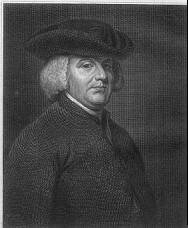William Paley (theologian)
William Paley (born July 14, 1743 in Peterborough , Northamptonshire , † May 25, 1805 in Lincoln , Lincolnshire ) was an English theologian and philosopher .
Life
William Paley was initially tutored by his father of the same name, who was a teacher at the Grammar School in Giggleswick . On November 16, 1758 he was admitted to Christ's College , Cambridge , as "Sizar" . As the best of his class ("Senior Wrangler") he graduated in January 1763 as a Baccalaureus Artium and transferred for a short time to the Academy in Greenwich . On June 24, 1766, at the age of 23, Paley was elected a " Fellow " of Christ's College and returned to Cambridge. He graduated with a Master of Arts degree , gave private lessons and was ordained a priest on December 21, 1767 by the London Bishop Richard Terrick (1710–1777) . From 1768 Paley taught at Christ's College. He has lectured on Samuel Clarke , Joseph Butler, and John Locke, and moral philosophy .
In 1776, Paley became principal at Musgrave, Cumbria, and in 1782 archdeacon at Carlisle . On the advice of his friend John Law (1745-1810) he published a revised and expanded version of his lectures in 1785 under the title The Principles of Moral and Political Philosophy . A View of the Evidence of Christianity followed in 1794 , which was compulsory reading at Cambridge University into the 20th century .
Act
Natural theology
In his book Natural Theology , published in 1802 , Paley argued for the work of a creator in nature based on the watchmaker's analogy . If one were to find a stone, one could assume that it had always been there. But if one were to find a watch, one would hardly suspect it. From the practicality with which the individual parts of the watch are put together, one must conclude that the watch had an intelligent creator, the watchmaker. Consequently, a living organism, whose body parts work together just as effectively as the parts of the clock, must have an intelligent creator, whom Paley also calls a designer .
Paley's reasoning is an example of attempting a teleological proof of God using specified complexity .
Influence and further discussion
Paley's natural theology placed the universal adaptation of living beings at the center of his proof of a Creator and an immutable creation. Paley's static adaptationism seems paradoxically to have just had an influence on the evolutionary adaptationism of Charles Darwin, which was supposed to undermine British natural theology through his theory of natural selection.
Today, the development of complex-organized systems like the human eye or the brain in biological sciences is generally explained by the theory of evolution . Among other things, Paley's comparison was taken up directly as the apparent result of a systematic design by Richard Dawkins in the title of his book The Blind Watchmaker , but explained in evolutionary terms through the work of mutation and selection, without the need for a creator god.
Works (selection)
Original editions
- The Principles of Moral and Political Philosophy . 1785 online
- Horae Paulinae: or the truth of the Scripture history of St. Paul evinced by a comparison of the epistles, which bear his name, with the acts of the apostles and with one another . 1790
- A View of the Evidences of Christianity . 1794 online full text
- Natural Theology, or Evidences of the Existence and Attributes of the Deity, Collected From the Appearances of Nature . 1802 online
German translations
- Principles of morality and politics . Translated by Christian Garve, Weidmanns Erben und Reich, Leipzig 1787; Volume 1 - Volume 2 - Internet Archive
- Review and examination of the evidence and testimonies for Christianity . Translated by Johann August Nösselt, Weigand, 1797 - 2 volumes
- Natural theology . Translated by Hermann Hauff. Verlag der JG Cotta'sche Buchhandlung , Stuttgart and Tübingen 1837; on-line
Current issues
- William Paley: Natural Theology , with an introduction by MD Eddy and DM Knight (Eds.). Oxford University Press, 2005, ISBN 0-19-280584-3
literature
- George Wilson Meadley: Memoirs of William Paley . In: The Works of William Paley . Volume 1, pp. 9 ff., Joshua Belcher, Boston 1810 - 5 volumes; on-line
- Graham Colea: William Paley's Natural Theology: An Anglican Classic? In: Journal of Anglican Studies Volume 5, pp. 209-225 Cambridge University Press, 2007; doi: 10.1177 / 1740355307083647
- Johannes Madey : William Paley (theologian). In: Biographisch-Bibliographisches Kirchenlexikon (BBKL). Volume 16, Bautz, Herzberg 1999, ISBN 3-88309-079-4 , Sp. 1183-1185.
- Momme von Sydow: Darwin - A Christian Undermining Christianity? On Self-Undermining Dynamics of Ideas Between Belief and Science . In: David M. Knight, Matthew D. Eddy (Eds.): Science and Beliefs: From Natural Philosophy to Natural Science, 1700-1900 . Ashgate, Burlington 2005, ISBN 0-7546-3996-7 , pp. 141-156; psychologie.uni-heidelberg.de (PDF)
- Paley, William . In: Encyclopædia Britannica . 11th edition. tape 20 : Ode - Payment of Members . London 1911, p. 628 (English, full text [ Wikisource ]).
Web links
- DL Le Mahieu: Paley's Moral Philosophy . (English)
- Martin Mahner: Intelligent Design and the Teleological Proof of God . 2007
- Works by and about William Paley in the German Digital Library
Individual evidence
- ↑ William Paley (1743-1805)
- ↑ von Sydow: psych.uni-goettingen.de ( Memento from February 5, 2009 in the Internet Archive ; PDF) 2005
| personal data | |
|---|---|
| SURNAME | Paley, William |
| BRIEF DESCRIPTION | English theologian and philosopher |
| DATE OF BIRTH | July 14, 1743 |
| PLACE OF BIRTH | Peterborough , Northamptonshire |
| DATE OF DEATH | May 25, 1805 |
| Place of death | Lincoln (Lincolnshire) |
